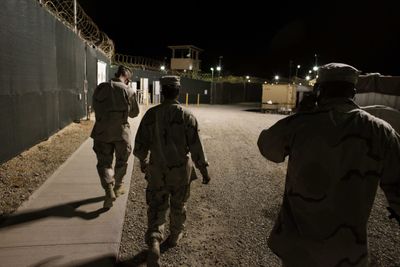Military commissions to be revived
Some detainees would be tried using Bush-era system

WASHINGTON – The Obama administration will announce plans today to revive the Bush-era military commission system for prosecuting accused terrorists, current and former officials said, reversing a presidential campaign pledge to rely instead on federal courts and the traditional military justice system.
Word of the imminent decision infuriated human rights groups, which argued that any trials under the system created by President George W. Bush would be widely viewed as tainted and said the Obama administration was duplicating Bush’s mistakes.
The announcement would follow other moves by President Barack Obama that have disappointed the administration’s liberal allies but heartened Bush supporters – including the decision to withhold photos of detainees who allegedly were abused and to retain the option of using a limited form of rendition, the practice of turning terrorism suspects over to other countries for questioning.
White House officials insisted Thursday that Obama was not overturning a campaign vow. The president “never promised to abolish” military commissions, an administration official said. However, Obama during his campaign repeatedly called for change.
“It’s time to better protect the American people and our values by bringing swift and sure justice to terrorists through our courts and our Uniform Code of Military Justice,” Obama said in one statement on the subject in August.
The administration still intends to prosecute some detainees now at Guantanamo Bay, Cuba, in federal courts, as Obama had pledged. But officials have concluded that a small number can only be tried in the military commissions, said one U.S. official familiar with the decision, speaking on condition of anonymity in advance of today’s announcement.
The administration also will outline major changes to the military commission system that will be used in future trials.
Gabor Rona, the international legal director of Human Rights First, said military commission trials are unlikely to be seen as legitimate forms of justice.
“Everyone knows the military commissions have been a dismal failure,” Rona said. “The results of the cases will be suspect around the world.”
But Charles Stimson, a former Bush administration official who oversaw detainee affairs at the Pentagon, applauded Obama’s proposal as one that would bring needed change to the military commission system while keeping it intact.
“It is a good start. The closer they get to courts-martial the better,” Stimson said. “They should learn from the mistakes the Bush administration made, then proudly defend the military commissions.”
Under the commission system, military officials have obtained three convictions in eight years, while charges against another 21 war crimes suspects are pending. Trial plans for more than 200 other detainees are undecided.
The Obama administration contends its revisions would improve the system by banning the use of any evidence obtained through coercion and restricting the use of hearsay evidence.
The rule changes also will give detainees more latitude in choosing lawyers to represent them, according to the U.S. official.
But those changes are widely viewed as cosmetic by critics in and out of government.
For example, under the Military Commissions Act – the law enacted by Congress in 2006 to retool and sanction the system – rules against evidence obtained through coercion were fairly strict. And in practice, military judges have refused to allow any coerced testimony in trials.
In his first week in office, Obama ordered all military commission trials be halted for 120 days and subsequently announced he would close Guantanamo within a year.
As part of today’s announcement, the administration will announce a further 120-day delay in any commission trials, preventing legal proceedings from resuming at least until mid-September, the U.S. official said. The administration also would consider further changes to the system recommended by lawmakers.
Stimson said commissions would work best in relatively simple cases. The most complex cases, including that against self-proclaimed Sept. 11 organizer Khalid Sheikh Mohammed, should be moved to federal court, where prosecutors are more experienced than military judge advocate generals, Stimson said.
The Bush-era system was reviled not only by human rights advocates but by military officials as well.
Three retired senior officers who served in key positions in the military justice system wrote to Obama on Thursday in a last-ditch attempt to derail revival of the commissions, warning against an “erosion of international confidence” in U.S. justice.
“Our federal criminal justice system has capably handled hundreds of complex terrorism cases … rendering decisions that are widely respected as legitimate,” wrote retired Vice Adm. Lee F. Gunn, the former Navy inspector general; retired Rear Adm. John D. Hutson, the former Navy Judge Advocate General; and retired Brig. Gen. James P. Cullen, the former chief judge of the U.S. Army Court of Criminal Appeals.